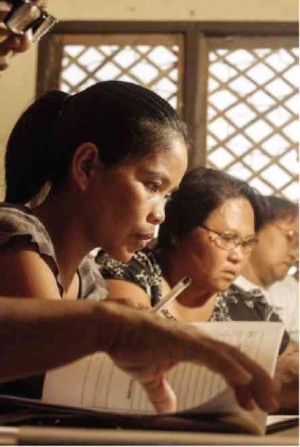MANILA, Philippines–A year after the strongest typhoon to ever make landfall hit Eastern Visayas hard, many residents who lost their homes and livelihood are firmly back on their feet.
Among them are sari-sari store owners belonging to the Hapinoy network, like Elizabeth Nudalo, who have learned new ways of running their business, helping them earn more than they did before Super Typhoon “Yolanda” struck.
Nudalo, 48, who was one of the beneficiaries of the Project Bagong Araw run by Hapinoy in cooperation with AirAsia Foundation, learned, for example, the immense benefits that come from faithfully recording inventory, sales and expenses involved in the running of her revived sari-sari store.
“I realized that listing down everything—even the smallest thing—is very important because it gives me a better picture of where the money goes. Now I know how much capital I use and the budget I should follow,” said Nudalo in Filipino, “I also learned during the training sessions that it was not wise to use the same money for personal and business use. Now I have better control over the finances and I also have a better idea of how much I actually earn from the business.”
She said the simple listing down of sales and expenses—a task she never did before—helped her immensely in finding out the real cost of her operations that bring in gross earnings of about P1,000 a day. It also pointed out to her the items that sold well and those that were not popular with the clients. The mother of four added that, with this basic lesson in financial management, she gained a firmer grasp of household operations.
Another beneficiary of the lessons in careful recordkeeping is Eva Espoho.
“I learned that simple things such as recordkeeping and cashflow tracking is very important because this is how we will actually see how much is coming in and going out of our store, and also how much my family and I are taking from the store,” Espoho said in a statement.
Espoho added that since the training was rolled out seven months after Yolanda devastated central Philippines, she had talked to her children about changes in the running of the sari-sari store in Palo, Leyte.
She told them that they need to control and record what they get from the store for better management.
Eduardina Calamayan, also of Palo, Leyte, shares Espoho’s sentiment on the value of recordkeeping and how she has embraced the concept after learning about it during the training session run by Hapinoy.
The 46-year-old mother of four said she used to record costs and expenses, but she was not able to sustain it because of her many responsibilities at home and at work.
She admitted that she did not know how much she really earned from her sari-sari store since the earnings at the end of every day were used for both personal and business expenses.
But after learning and appreciating the value of recordkeeping, she said she was now more committed to writing down everything, if only to know how much she really earns—and spends—every day.
Through basic recordkeeping, Calamayan said she feels she has better control of her sari-sari store’s operations and it also allowed her to put together a budget for the home.
“With recordkeeping, I now also have better control of household expenses. Today, I am more inclined to buy goods for the store when I earn extra, unlike before when I am tempted to just go and shop when I have money in my pocket,” said Calamayan in Filipino.
She hopes that recordkeeping will be just the first of many skills she can learn from the program to further grow her variety store, which has helped put food on the table.
Further training for microentreprenuers is indeed in store under Project Bagong Araw, which aims to arm microentrepreneurs with skills and knowledge necessary to breathe new life to the enterprises lost to Yolanda.


